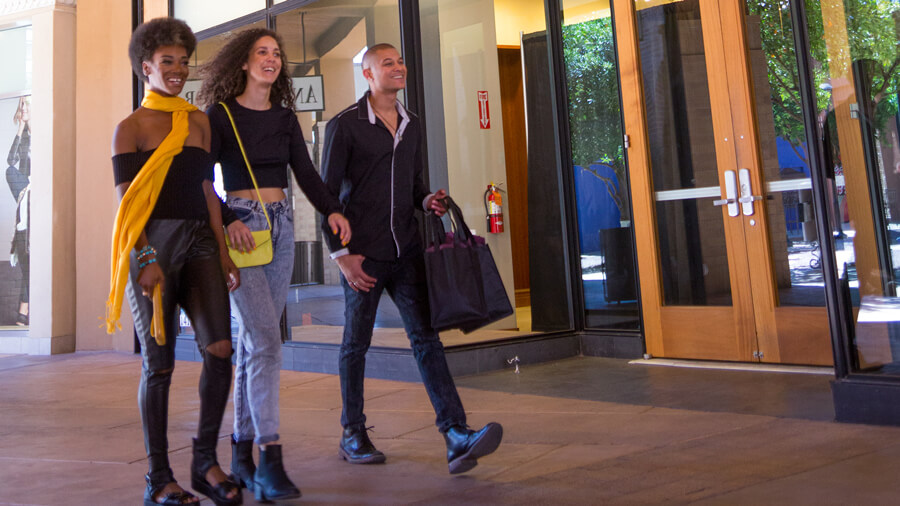It’s that time of year, once again, when you can spot long, winding lines snaking their way around Macy’s, Target, and other large retailers. In the U.S., we instinctually patronize large retailers because we’re led to believe they have the best products for the best prices around the holiday season.
But this is also the best time to check out what local retailers are offering.
Sure, skipping the long lines and the angry glares are a plus, but local retailers also offer a host of benefits unique to smaller businesses. Still, many of us continue to hold misconceptions about local retailers and think they’re inferior to the big guys.
It’s time to confront these myths and set the record straight, once and for all.
1) “Local retailers don’t offer online shopping.”
Shopping online and shopping local aren’t either/or scenarios.
Local retailers understand that the times call for an “innovate or die” mindset, where those who adopt mobile technology and e-commerce survive. Plenty of Tucson-area retailers, such as Razorz Edge, Popcycle, Bon, and Mildred & Dildred, offer easy-to-navigate websites, desirable return policies, and a simple checkout process.
Most local retailers also update their online inventory regularly, but it’s always nice to drop in to the physical location, since they’re always receiving new items.
2) “You get the same service and experience at a large retailer.”
Service is one area where local retailers benefit from their smaller size.
It’s common to speak directly with the owner of a local business, who’s also a member of your community. This level of connection results in both more empathetic interactions and a better overall customer experience.
It’s also easier to get an unorthodox request satisfied at a local retailer, since there’s less bureaucratic red tape to navigate. The last thing anyone wants during the holiday season is a headache from bad, impersonal customer service.
3) “Local retailers have lower quality products than large and online retailers.”
Here’s a misconception that couldn’t be further from the truth—because local retailers are actually more likely to offer high-quality products that last.
According to an American Express study, 69% of respondents said they can access more high-quality goods by shopping local. And there’s no wonder why. Artisans take pride in their work, so it’s in their best interest to make their creations last. Plus, many locally sold products are one-of-a-kind, so there’s an added emotional value to shopping local.
Aside from quality, you’re also more likely to find unique items that you won’t see at a larger retailer. According to a UPS Pulse Report, 61% of U.S. consumers shop local because they’re able to find more unique products, while 49% turned to shopping local because they couldn’t find what they wanted elsewhere.
And while online retailers might offer easy returns, by the time you find the dress that fits, that holiday party might have already passed. Shopping locally allows you to personally inspect the quality and fit of a product, meaning you’ll save time on returns.
4) “Local retailers carry fewer products.”
When it comes to products, the only difference between small and large retailers is, well, size. The truth is that smaller, local merchants have the same access to products as big retailers, but due to space constraints, they’re forced to display a limited number of items. However, most local retailers are willing to special order any available item, usually at no additional cost.
And sometimes less is more when it comes to curating a pleasant shopping experience.
Cluttered atmospheres can be especially unnerving during the holiday shopping season, which might be why large retailers like Nordstrom, Kohl’s, and Target rolled out some smaller-format stores across the U.S. that feature fewer products (or in Nordstrom’s case, no products).
5) “Shopping locally doesn’t matter.”
Oh, but it does! If you’ve ever driven over a pothole-filled road, or felt sad when you saw a boarded-up shopfront, then you know the feeling of wanting to improve your community.
Shopping local enables money to be reinvested back into the surrounding community, so roads can be fixed and those new businesses can open. According to the Indie Impact Study, for every $100 spent at a locally owned business, $43 remains in the surrounding economy. In contrast, only $13 stays in the local economy for every $100 spent at a non-locally owned business.
Buying locally also has environmental benefits, compared to shopping at larger or online retailers. For example, although Amazon Prime’s 2-day shipping has earned Amazon a host of new customers, it has also put more delivery trucks on our roads. But if we shop local, we can reduce our carbon footprint and help make our economy more environmentally sustainable.
Local businesses also tend to be more economical with space, meaning less electricity use than large, big-box retailers. Some Tucson-area shops have even gone the extra mile by going carbon neutral with the help of solar power. Antigone Books and TriSports are two Tucson businesses that went 100% solar with the help of Technicians for Sustainability. So when you shop at these local businesses, you’re also giving the gift of environmental responsibility.
Finally, local businesses create jobs. Lots of them. According to a study by the Small Business Administration, 63% of new jobs in the U.S. were created by small businesses between 1993 and 2013. Furthermore, these jobs tend to be more fulfilling than working for a larger retailer, since employees have more interest in keeping the business afloat knowing it contributes to the viability of their community.
There are plenty of ways to help your community this holiday season, but the easiest way to make a difference is to think about where your money goes and how you can spend it more wisely. We are all a part of a wider community and it’s up to us to realize that our economic decisions directly impact our surroundings.

